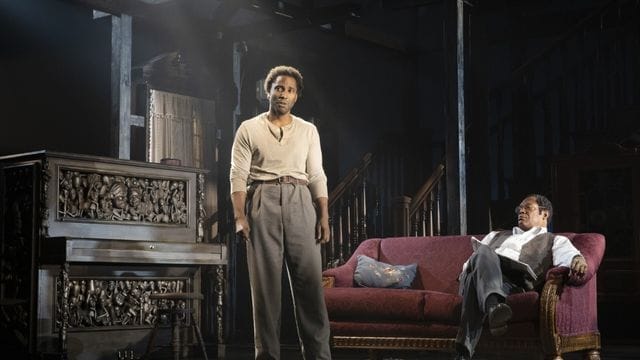A must-see, star-studded revival of August Wilson’s Pulitzer Prize-winning drama The Piano Lesson is currently running at the Ethel Barrymore Theatre in New York City. This production of the play is not to be missed.
John David Washington, a former football player turned actor, approaches the role with the same ferocity and showmanship often inhabited by characters played by his parents, Denzel Washington and Kerry Washington. The 1987 story, which is the fourth in Wilson’s famed 10-play Pittsburgh Cycle chronicling the evolution of Black America through the 20th century, is back on the boards for the first time in over 30 years in a production packed with an embarrassment of impactful performances led by the electric John David Washington.
It is an audacious debut on Broadway, and it is matched by the incredible company of actors that director LaTanya Richardson Jackson has assembled for this revival. Some of the actors in the cast include Danielle Brooks, Michael Potts, Ray Fisher, April Matthis, and Trai Byers, as well as Richardson Jackson’s husband, Oscar winner Samuel L. Jackson.
All of them bring Wilson’s eerie masterwork back to life with amazing emotional depth, making the great playwright’s poetic lines sing like the sound pouring out of the cherished piano that is at the centre of the play’s conflict.
Washington, who was nominated for a Golden Globe for his breakthrough role in BlacKkKlansman and can currently be seen on screen in Amsterdam, plays Boy Willie, a steadfast and boisterous businessman who returns to 1936 Depression-era Pennsylvania to collect the heirloom instrument. In the film, Washington was also nominated for a Golden Globe for his role in BlacKkKlansman. He has high hopes that he will be able to sell it and then use the proceeds, in addition to the money he has put aside, to purchase the farmland in Mississippi that was formerly owned by John Sutter, who passed away not long ago and was the slave owner of his family during the time of slavery.
Stopping Boy Willie’s attempts are being supported by his sister Bernice (Brooks), who is the keeper of the keys. Bernice claims that the piano should stay in the family because their father passed away while stealing it from Sutter. Even though she doesn’t play it, the piano is a part of their family legacy, Bernice explains, pointing to the carved images of their enslaved ancestors their father hand-crafted into the instrument’s wooden frame and reminding her brother of the care their mother took towards preserving the piece after her husband’s death.
That fundamental difference — between one trying desperately to hold onto a family legacy and another hoping to progress further than his ancestors were ever able to — drives the action throughout the entirety of The Piano Lesson, with Wilson ultimately using the story as a reminder to embrace where you come from before you move forward. The Piano Lesson was written by Robert Wilson.
But it also leads to a haunting and thunderous climax, in which Washington and Brooks propel their characters forward into an explosive face-off.
Brooks, who was most recently seen performing on Broadway in The Color Purple, is without a doubt turning in the best work of her career as Bernice. Brooks was a highlight on Orange Is the New Black. She has imbued the role of the single mother with an equal amount of strength and anguish, as well as dread and fidelity. And just when you think you know where she’s heading, Brooks takes a turn, finding fresh moments to explore while leaving the audience hanging on her every word. [Case in point:]
Jackson’s performance as Doaker Charles, Boy Willie and Bernice’s uncle who tries his best to maintain his impartiality despite being caught in the middle of their conflict, is consistent and reliable. The actor has previous experience with the play because he created the part of Boy Willie during the show’s debut performance at the Yale Repertory Theatre in the year 1987. Jackson continues to be the production’s backbone despite now playing a more paternal and restrained role. He also continues to create tiny, almost cinematic character qualities that give the role amazing depth.
